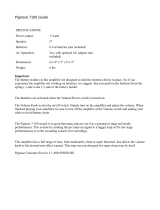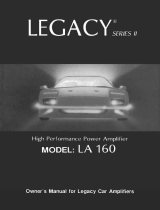
12
Crossovers (continued)
HAWKINS – This is a patented circuit developed by Soundstream many years ago. Hawkins has 2 controls but 3
functions. One of the controls is the boost and it is from 0-10dB. The second control is the frequency. What-
ever frequency you select will be the frequency that is controlled by the adjustable boost. The third function is a
tracking subsonic filter. Basically, at the frequency point you choose to boost, all lower frequencies will be
blocked by the tracking subsonic filter to avoid damage to speakers. For example, your subwoofer starts to
lose output at 50Hz. You can set the frequency to 40Hz and boost up to 10dB, but you do not have to worry
about super low frequencies damaging your speakers because no music material below 40Hz will go to the
subwoofers. Or, let’s say your subwoofer plays just fine, but at 20Hz tones it starts to flutter and get distorted.
You can set the Hawkins at 20-25Hz and not use the boost, but still take advantage of the subsonic filter sub-
woofer protection.
Bass EQ – This circuit allows you to choose a frequency between 30Hz and 80Hz and boost that frequency by
0-12dB.
Xover Mode Switch – Select HP/FR for High Pass / Full Range and only the HIGH PASS functions will work. The
High Pass filter is never off, but can be set to 15Hz which passes the entire audible spectrum to be reproduced.
If you select LP/BP for Low Pass and Band Pass, then the LOW PASS function works as well. You can use the
Low Pass in conjunction with the always-on High Pass to band pass the signal to the drivers. For example...
Let’s say you have 3-way components consisting of a 1” tweeter, 4” midrange and a 6.5” midbass. Your 4” and
1” are on another amplifier. You can set the midbass to play just the midbass frequencies by setting the LOW
PASS to 400Hz and setting the high pass to 60Hz. This will effectively give you a dedicated midbass region
that will not overlap into the midrange frequencies or subwoofer frequencies.
Input Gain – While most people set this control by ear to how loud they want their music, this is not the intent of this
control. The range is from 0.2 volts to 9 volts. The control is meant for matching to the source unit’s output sig-
nal voltage. For example, if you have a unit with low output voltage, you would probably have the control set
fairly high, towards the 0.2V range. A lot of head units have 4 volts of signal voltage which mean that your con-
trol would be set in midway through the range. If you happen to have a line driver (signal booster) that yields 9
volt or more, you will set the gain at the minimum position. In all of these examples, when properly level
matched, the amplifier will put out full volume. Setting the control above the proper point may cause damage to
the amplifier and speakers, and can result in poor sound quality and overall undesirable results…
RCA Signal Inputs – Ummm… If you do not know what goes here, get over to your local Soundstream dealer
immediately!
3
4
5
6
7





















